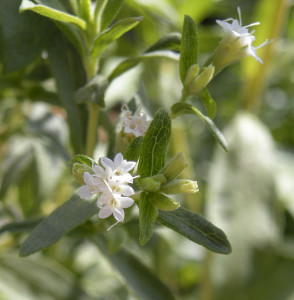Stevia rebaudiana is a plant species in the genus Stevia of the sunflower family (Asteraceae), commonly known as candyleaf, sweetleaf, sweet leaf, or sugarleaf.
Contents
Uses
Stevia is a sweetener that is naturally low in calories and does not raise your blood sugar level when consumed.
Benefits
- Stevia herb parts are very low in calories. Parts by parts, its dry leaves possess roughly 40 times more sweetness than sugar. This sweetness quality in stevia is due to several glycoside compounds including stevioside, steviolbioside, rebaudiosides A-E, and dulcoside.
- Stevioside is a non-carbohydrate glycoside compound. Hence, it lacks the properties that sucrose and other carbohydrates possess. Stevia extracts, like rebaudioside-A, are found to be 300 times sweeter than sugar. Besides, being a near-zero calorie food ingredient, stevia extracts have several unique properties such as long shelf life, high temperature tolerance, non-fermentative.
- Furtehr, stevia plant has many sterols and antioxidant compounds like triterpenes, flavonoids, and tannins. Some of flavonoid polyphenolic anti-oxidant phyto-chemicals present in stevia are kaempferol, quercetin, chlorogenic acid, caffeic acid, isoquercitrin, isosteviol…etc. Studies found that kaempferol can reduce risk of pancreatic cancer by 23% (American journal of epidemiology).
- Chlorgenic acid reduces enzymatic conversion of glycogen to glucose in addition to decreasing absorption of glucose in the gut. Thus, it helps reduce blood sugar levels. Lab studies also confirm a reduction in blood glucose levels and an increase in the liver concentrations of glucose-6-phosphate, and of glycogen.
- Certain glycosides in stevia extract have been found to dilate blood vessels, increase sodium excretion, and urine output. In effect, stevia, at slightly higher doses than as sweetener, can help lower blood pressure.
- Being a non-carbohydrate sweetener, stevia would not favor the growth of Streptococcus mutans bacteria in the mouth which is attributed to be a causative agent of dental caries and tooth cavities. On the other hand, certain compounds in stevia rather found to inhibit caries causing bacteria in the mouth.
- In addition, being a herb, stevia contain many vitals minerals, vitamins that are selectively absent in the artificial sweeteners.
Caution
In some cases, stevia can cause a severe allergic reaction called anaphylaxis, but this is a relatively rare occurrence. According to the New Health Guide website, however, those with pre-existing allergies to chrysanthemums, marigolds, ragweed or daisies are at greater risk of a stevia reaction. Symptoms of an allergic reaction include dizziness, hives, shortness of breath, wheezing, general weakness or having a hard time swallowing shortly after consuming stevia. If any of these symptoms present themselves, seek emergency medical attention immediately.
Interactions
None are recorded.
Other names
candyleaf, sweetleaf, sweet leaf, or sugarleaf
Reference
Source: NutritionAndYou, http://www.nutrition-and-you.com/stevia-plant.html
Wikipedia, https://en.wikipedia.org/wiki/Stevia_rebaudiana
LiveStrong, http://www.livestrong.com/article/368454-known-side-effects-of-stevia/

